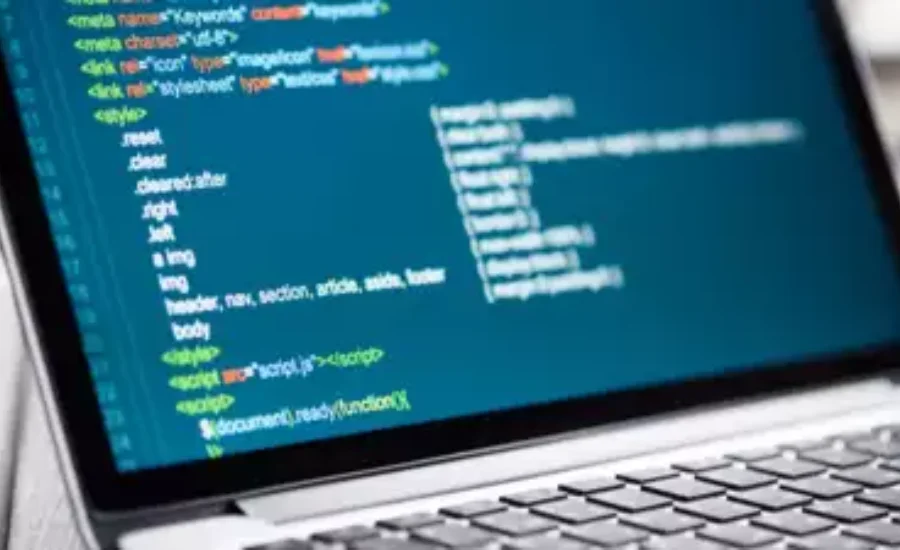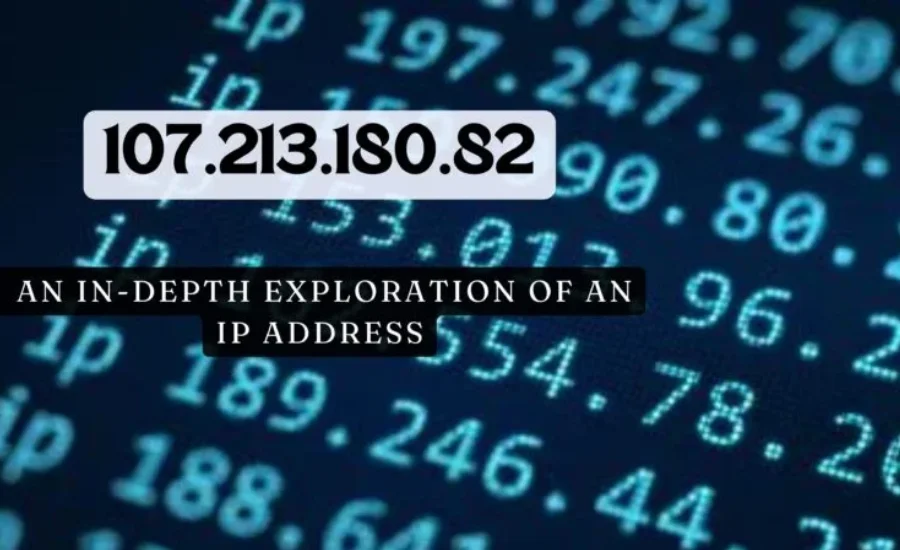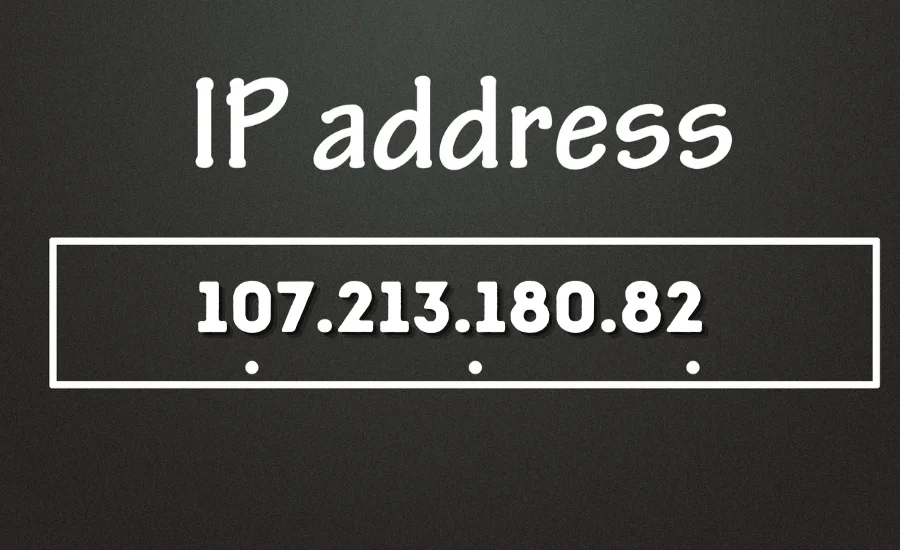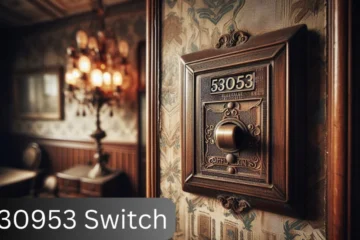IP addresses are the building blocks of how devices are identified and communicate within networks, playing a critical role in the functionality of the internet. Among the vast array of IP addresses, one that has garnered significant attention from IT experts, cybersecurity professionals, and tech enthusiasts alike is 107.213.180.82. But what makes this particular IP address stand out?
To understand its relevance, we’ll dive into its technical background and explore how it fits into the broader structure of the internet, shedding light on why it has become a topic of interest across various sectors.
What Exactly is 107.213.180.82?
In simple terms, 107.213.180.82 is an IPv4 public address. To break this down:
- IPv4 (Internet Protocol version 4) is the most widely used format for IP addresses and consists of four sets of numbers separated by periods. Each segment can range from 0 to 255, creating billions of potential combinations.
- The structure of 107.213.180.82—”107,” “213,” “180,” and “82”—follows this pattern, making it unique within its network.
- This IP falls into the public IP category, meaning it is visible and accessible across the broader internet.
A public IP address, like 107.213.180.82, serves as a unique identifier that helps route data between devices on different networks, essentially guiding the traffic to the right destination, much like a postal address for the internet.
Decoding IP Address 107.213.180.82: Its Role and Importance in the Internet Ecosystem

IP addresses serve as the backbone of how devices communicate on the internet, allowing information to travel seamlessly between servers, computers, smartphones, and other connected devices. Among the billions of IP addresses in use, one that has garnered attention is 107.213.180.82. While it may seem like just a random set of numbers, this IP address carries significance in understanding network management, cybersecurity, and how the broader internet infrastructure operates.
Let’s explore the technical aspects, potential uses, and security considerations surrounding 107.213.180.82, breaking down why it matters and how it fits into the digital landscape.
What is an IP Address? Understanding 107.213.180.82
An IP address, or Internet Protocol address, is a unique identifier assigned to each device when it connects to a network or the internet. It functions much like a physical home address, directing data to the correct destination. The IP address 107.213.180.82 follows the IPv4 format, which is still the most commonly used addressing scheme today. IPv4 addresses consist of four numerical segments, separated by periods, with each segment containing a number between 0 and 255.
For example, in the IP 107.213.180.82, the segments “107,” “213,” “180,” and “82” each represent a range that helps pinpoint the location and device in the vast network of the internet. While the IPv4 system has been largely effective, the growing number of connected devices has pushed the internet towards the adoption of IPv6, a more expansive addressing system.
Public vs. Private IP Addresses
One of the key distinctions in IP addressing is between public and private IPs. The address 107.213.180.82 is a public IP, meaning it is accessible from anywhere on the internet. Public IP addresses are typically assigned by Internet Service Providers (ISPs) and allow for communication between devices across different networks globally.
In contrast, private IP addresses are restricted to local networks, such as home Wi-Fi or corporate intranets. These private IPs are only visible within their own network and cannot communicate directly with devices outside of that network without a gateway or router that handles the translation between public and private addresses.
The Role of Public IP Addresses Like 107.213.180.82
Public IP addresses such as 107.213.180.82 play an essential role in ensuring that data can travel between different networks, websites, and devices around the globe. Whether it’s for web hosting, connecting cloud services, or enabling remote access to networks, public IPs are fundamental to how the internet functions.
Because public IP addresses are unique, they help ensure that data packets reach the correct destination. If you were to access a website or send an email, your device’s IP address allows the data to be routed back to you. Without public IP addresses, seamless global communication between devices would be impossible.
Tracing 107.213.180.82: Geolocation and ISP Information

One of the key pieces of information linked to an IP address like 107.213.180.82 is its geolocation—the physical region or country where the address is based. By conducting an IP lookup using tools like WHOIS, you can determine which Internet Service Provider (ISP) owns the IP address and the approximate location of its server or network.
For example, if 107.213.180.82 is being used by a data center or a cloud service provider, the geolocation lookup might reveal that the address belongs to a particular region or city. However, while an IP address can provide general information about location, it does not give exact details about a specific user or device unless further investigation by authorities is carried out.
Potential Uses of 107.213.180.82 in Internet Infrastructure
Public IP addresses like 107.213.180.82 are crucial for various online services, including:
- Web Hosting: Public IP addresses are commonly associated with web servers that host websites. If 107.213.180.82 is linked to a server, it may be responsible for hosting one or more websites. By performing a reverse DNS lookup, it’s possible to find out which domain names are associated with this address, revealing whether it is hosting a personal blog, a business website, or a large-scale online service.
- Cloud Services and Data Centers: Many data centers and cloud service providers use pools of public IP addresses like 107.213.180.82 to manage virtual machines, databases, and cloud applications. These addresses allow users to access services hosted in the cloud, and in many cases, the IP may be dynamically assigned depending on client needs.
- Remote Connections via VPNs: Virtual Private Networks (VPNs) often assign public IP addresses to users for secure internet access. A VPN using an IP address like 107.213.180.82 would allow users to encrypt their connection, hide their real location, and safely browse the web or connect to remote servers.
Is 107.213.180.82 Safe?

Simply seeing an IP address like 107.213.180.82 on your network doesn’t necessarily mean anything malicious is happening. However, if this address appears unexpectedly in network logs or security alerts, it’s wise to investigate further. Here are a few steps you can take:
- Check for Familiarity: Verify if 107.213.180.82 is associated with a known device, service, or website. If it’s an unfamiliar address, investigate its origin through an IP lookup.
- Monitor Activity: Look for repeated attempts from 107.213.180.82 to access your systems. If there are multiple connection attempts, it could be a sign of a security threat, such as a hacking attempt or a DDoS attack.
- Consult a Security Expert: If you’re unsure about the safety of 107.213.180.82 or any IP address on your network, consult a cybersecurity professional who can conduct a deeper investigation and advise on appropriate measures.
Is 107.213.180.82 Secure? Common Security Concerns
Public IP addresses like 107.213.180.82 can sometimes attract the attention of hackers or cybercriminals seeking to exploit vulnerabilities. Common security threats linked to public IPs include:
- DDoS Attacks (Distributed Denial of Service): Hackers may flood an IP address with massive amounts of traffic, overwhelming its network and causing it to crash. If 107.213.180.82 were to be targeted, it could disrupt the service or website associated with it.
- Spam and Malware Distribution: Some IP addresses are used to send spam emails or distribute malware. Tools such as Spamhaus and Project Honey Pot track public IP addresses to see if they’ve been involved in suspicious activities. If 107.213.180.82 has been blacklisted for malicious behavior, this could indicate past involvement in spam or security breaches.
However, most public IPs are used for legitimate purposes. It is only when a particular address shows up in logs or security alerts repeatedly that further investigation may be necessary.
How Firewalls and Security Tools Help Protect Networks
Organizations and individuals can use firewalls and other security protocols to monitor and control traffic to and from IP addresses like 107.213.180.82. Firewalls work by filtering potentially harmful connections and allowing trusted IPs to communicate freely. If a particular IP is identified as a threat, it can be blacklisted, meaning that any data from that address will be blocked.
Conversely, whitelisting involves marking certain IP addresses as trusted, allowing communication between systems without restrictions. This is often done in corporate environments where certain IPs must have consistent, unrestricted access to resources.
Practical Steps for Protecting Your IP Address
Securing your IP address and network against potential threats is critical in today’s internet landscape. Here are a few practical steps to protect addresses like 107.213.180.82 from malicious activity:
- Use a VPN: A Virtual Private Network (VPN) encrypts your internet traffic and hides your real IP address, making it harder for hackers or third parties to track your online activity.
- Enable Firewalls: Firewalls are a crucial defense mechanism that can block unauthorized access to your network. Configuring firewalls properly ensures that only trusted IP addresses can communicate with your system.
- Regularly Update Network Devices: Keeping your routers, modems, and other network hardware updated with the latest security patches helps defend against known vulnerabilities that attackers may try to exploit.
Monitoring IP Addresses Like 107.213.180.82 for Security

For IT professionals and network administrators, monitoring public IP addresses like 107.213.180.82 is essential to maintaining a secure environment. There are several tools available to track the activity of IP addresses and ensure that they are being used correctly:
- SolarWinds IP Address Manager: This tool helps manage and monitor IP addresses across a network, ensuring that no unauthorized devices are accessing critical resources.
- Paessler PRTG Network Monitor: This software tracks network activity in real-time, alerting administrators if unusual behavior is detected involving IP addresses like 107.213.180.82.
- ManageEngine OpUtils: This tool provides comprehensive IP management, including tracking devices connected to the network and checking for conflicts or issues related to IP addresses.
The Importance of 107.213.180.82 in Modern Networking
In conclusion, 107.213.180.82 is more than just a random series of numbers; it plays a vital role in how the internet functions. Whether it’s used for web hosting, cloud services, or remote access, public IP addresses like 107.213.180.82 enable the global connectivity we rely on daily. Understanding how these addresses work, the security risks they pose, and how to protect them is crucial for both individuals and organizations in today’s digital age.
By taking steps to monitor and secure public IP addresses, network administrators and users alike can ensure safer, more efficient communication across the web.
Also Read: 9781016005555
Final Words
The IP address 107.213.180.82 is a public IPv4 address that plays a vital role in internet communication. Public IP addresses like this one allow devices to connect and exchange data across different networks globally, much like a postal address for the web. Whether it’s used for web hosting, cloud services, or VPN connections, 107.213.180.82 is essential for routing data and maintaining global connectivity. Monitoring and securing public IPs is crucial for protecting against cyber threats like DDoS attacks and malware. Tools like firewalls and VPNs help safeguard IP addresses, ensuring safer and more efficient online communication.
For expert insights and in-depth information on IP addresses like 107.213.180.82, explore Twinkle Crest and stay informed on the latest in internet technology.




